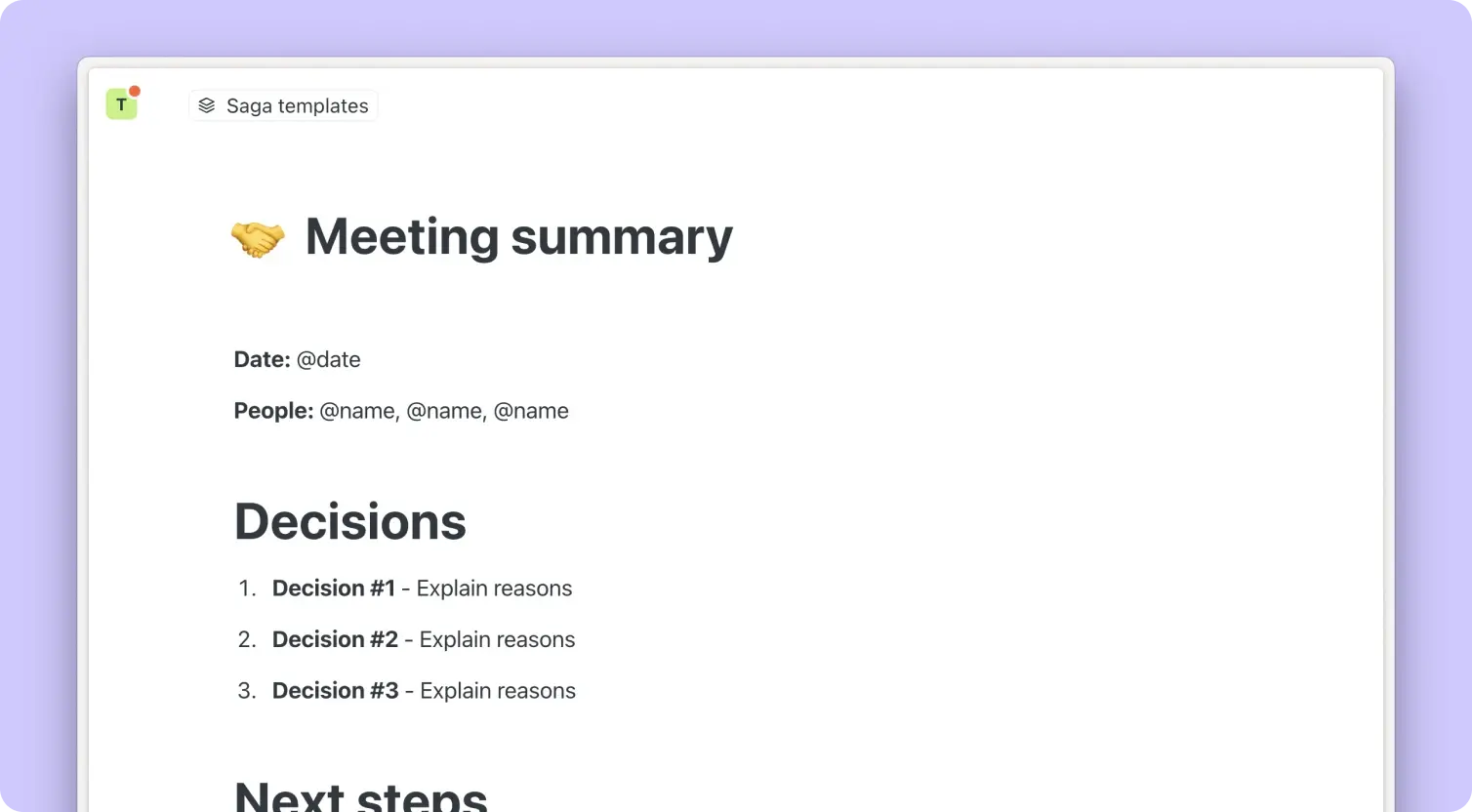Meeting summary

What is a meeting summary?
A meeting summary is a concise document that captures the essential information discussed during a meeting. This includes the main points discussed in the meeting, decisions made, action items, stakeholders and deadlines. The purpose of a meeting summary is to provide a clear and brief overview of the meeting, ensuring that everyone is aligned on outcomes and next steps - even if they didn’t attend the meeting.
Unlike detailed meeting minutes, a meeting summary focuses on the key takeaways, making it an efficient tool for communication and follow-up. It helps in keeping team members informed, especially those who were unable to attend, and serves as a reference for future actions and decision-making processes.
It’s useful to share meeting summaries to maintain momentum post-meeting and make sure teams quickly move forward with decisions. They also contribute to effective project management by documenting progress and aligning team efforts.
Benefits of meeting summaries
Creating meeting summaries offers several advantages, including enhancing team communication and productivity. They ensure that all participants, as well as those absent, are updated with the meeting’s outcomes, fostering an open and cohesive working environment.
They also facilitate accountability by clearly outlining action items and responsible parties, making it easier to track progress and follow up on commitments. This clarity helps in minimizing confusion and ensuring that tasks are completed as planned.
Moreover, meeting summaries serve as an official record of decisions and discussions, which can be invaluable for resolving disputes, recalling past decisions, and informing new team members. They contribute to organizational knowledge and can be referenced in future planning and decision-making processes.
Finally, the practice of summarizing meetings encourages more focused and efficient meetings. Knowing that outcomes will be documented, participants are more likely to stay on topic and contribute meaningfully, enhancing the overall productivity of meetings.
How to create a meeting summary?
Creating an effective meeting summary involves several key steps to ensure that all important aspects of the meeting are captured and communicated clearly. Here’s a simple guide to help you draft a comprehensive meeting summary:
1. Preparation
Before the meeting, decide on the format of the summary, or use our free template to see what information it should include.
2. Take notes
During the meeting, take detailed notes on the discussion, decisions made, action items, and any deadlines. Pay special attention to key points and consensus reached in the meeting.
3. Organize your notes
After the meeting, organize your notes by categorizing them into sections such as key decisions, action items, and next steps. This will make the summary easier to follow. You can also use Saga AI to summarize your notes in seconds.
4. Write the summary
Start with a brief introduction that includes the meeting date, attendees, and purpose. Then, detail the key points discussed, decisions made, and list the action items along with responsible parties and deadlines.
5. Review and edit
Ensure accuracy by reviewing the summary and making any necessary edits. It’s important that the summary is clear, concise, and free of any errors.
6. Distribute the summary
Share the meeting summary with all attendees and relevant stakeholders. You can tag them directly in Saga or send it by email.
7. Follow-up
Use the meeting summary as a reference in follow-up communications and meetings to track progress on action items and revisit decisions as needed.
By following these steps, you can create a meeting summary that serves as an effective tool for communication and ensures that your team remains aligned and informed on key outcomes and next steps.
Free template for meeting summary
To support the creation of effective meeting summaries, access our free template. It is structured to capture all essential information in a clear and organized manner, making it simple to customize for any meeting type.
Get started
Then click on "Copy Page" to duplicate it in your workspace.
